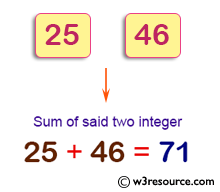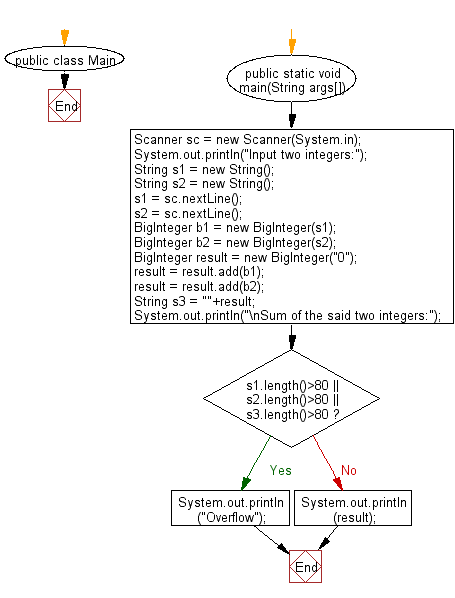Java: Compute and print sum of two given integers.
Sum of Two Large Integers with Overflow Check
Write a Java program to compute and print the sum of two given integers (more than or equal to zero). If the given integers or the sum have more than 80 digits, print "overflow".
Visual Presentation:

Sample Solution:
Java Code:
// Importing necessary Java libraries
import java.math.BigInteger;
import java.util.Scanner;
// Main class named "Main"
public class Main {
// Main method to execute the program
public static void main(String args[]) {
// Creating a Scanner object for input
Scanner sc = new Scanner(System.in);
// Prompting the user to input two integers
System.out.println("Input two integers:");
// Declaring and initializing two strings to store user input
String s1 = new String();
String s2 = new String();
// Reading the first integer as a string
s1 = sc.nextLine();
// Reading the second integer as a string
s2 = sc.nextLine();
// Creating BigInteger objects from the input strings
BigInteger b1 = new BigInteger(s1);
BigInteger b2 = new BigInteger(s2);
// Creating a BigInteger object to store the result of addition
BigInteger result = new BigInteger("0");
// Adding the two input BigIntegers and storing the result
result = result.add(b1);
result = result.add(b2);
// Converting the result to a string
String s3 = "" + result;
// Displaying the sum of the two integers
System.out.println("\nSum of the said two integers:");
// Checking for overflow by comparing the lengths of the input and result strings
if (s1.length() > 80 || s2.length() > 80 || s3.length() > 80)
System.out.println("Overflow");
else
System.out.println(result);
}
}
Sample Output:
Input two integers: 25 46 Sum of the said two integers: 71
Flowchart:

For more Practice: Solve these Related Problems:
- Write a Java program to compute the product of two large integers with overflow detection.
- Write a Java program to add two large integers represented as strings and detect overflow if the result exceeds 80 digits.
- Write a Java program to subtract two large integers with proper overflow and underflow checks.
- Write a Java program to multiply two large integers and print "overflow" if the result exceeds a specified digit limit.
Go to:
PREV : Check Point Inside Triangle.
NEXT : Sort Six Numbers in Descending Order.
Java Code Editor:
Contribute your code and comments through Disqus.
What is the difficulty level of this exercise?
Test your Programming skills with w3resource's quiz.
